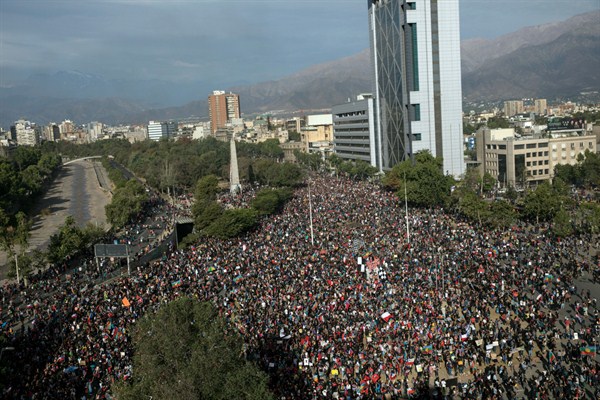For the Latin American right, Chile is a model country that gives credibility to their pro-market policies and reassures citizens that these policies can be socially inclusive. Conservative leaders from Argentina’s outgoing, center-right president, Mauricio Macri, to Brazil’s far-right president, Jair Bolsonaro, have lauded Chile as an example for their relatively closed economies to emulate. Yet the unexpected eruption of popular protests and the repressive security response that has cost the lives of at least 18 demonstrators have shaken the country’s image as a stable democracy, while raising questions about the downsides of those pro-market policies and the lingering legacy of the Pinochet-era.
Chile still stands out in a region known for its protectionism and high levels of poverty. Chile has free trade agreements with 64 countries that together account for almost 90 percent of global GDP, making it one of the most open economies in the world. In a rare feat, the country simultaneously reduced poverty, as the poverty gap fell from 24 percent in 1987 to 2 percent by 2017. The reason for this decline was an extraordinary period of economic growth. Between 1990 and 2019, Chile suffered only two years of recession. Between 2000 and 2018, average real income in Chile grew by 21 percent—third in the region behind Peru, at 26 percent, and Uruguay, at 23 percent. The real minimum wage also increased by a very respectable 65 percent over the same period.
But Chile remains one of the most unequal countries in the region, especially considering its level of economic development. Income inequality in Chile—as measured by the widely used Gini index, which measures inequality on a scale of 0 to 100, 0 being the most equal and 100 being the most unequal—stood at 46.6 in 2017, compared to Argentina’s 41.2 and Uruguay’s 39.5. According to Branko Milanovic, a renowned economist who studies inequality, Chile’s wealth inequality “is an outlier even compared to the rest of Latin America.”

